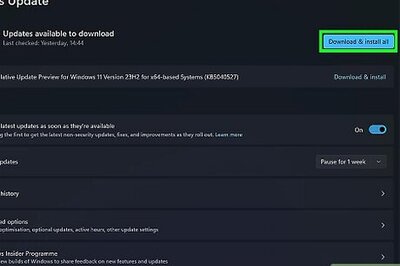
views
New Delhi: The Supreme Court will on Wednesday decide the fate of Aadhaar and its enabling 2016 law as it will pronounce its much-awaited judgment on whether the scheme is a violation of the fundamental right to privacy and personal body autonomy.
The five-judge Constitution Bench, led by Chief Justice Dipak Misra, had on May 10 reserved the verdict on the batch of 31 petitions challenging the validity of the scheme after a marathon hearing that went on for 38 days, spanning four-and-half months.
The bench is scheduled to give three opinions by Justices AK Sikri, DY Chandrachud and Ashok Bhushan. CJI Misra and Justice AM Khanwilkar have not authored judgments.
The petitions, several of which were filed before the 2016 law was passed, have raised a number of concerns regarding Aadhaar, including whether a person can be forced to share biometric information, does it enable profiling of individuals and create a surveillance state, does the scheme improve delivery of subsidies and finally, whether the massive amounts of data collected by Aadhaar body UIDAI is safe or susceptible to fall in the wrong hands.
The government and the Aadhaar body, the Unique Identity Authority of India (UIDAI), argued before the court that Aadhaar has covered 99% of the population and is accepted as a unique identifier by the masses. The government stressed that from 2009 to 2016, Aadhaar was completely voluntary, but people still signed up for it.
The case could go three ways. The SC may strike Aadhaar down as unconstitutional, forcing the government to dismantle the project and roll-back every initiative taken in connection with it. It may find Aadhaar constitutionally sound, allowing the government to retain the project in its current form and expand it going forward.
Or, the verdict may take the middle-ground, where certain aspects of Aadhaar are struck down and others retained. For instance, Aadhaar may be found constitutionally sound overall, but specific aspects like mandatory mobile and bank account linkages may be disallowed.
The Centre’s case rests on the argument that Aadhaar is the most efficient tool to disburse subsidies and other welfare services and mandatorily linking it is essential to check wrongdoing. Biometrics technology is a secure way to combat issues such as money laundering, bank frauds, income tax evasion and providing direct subsidies to beneficiaries, it told the court.
The state has no interest in collection of biometrics except for the benefit of the individual himself, the government said.
The government also argued that right to life trumps right to privacy, which was declared a fundamental right by the SC last year. “Right is not absolute and the State can always enforce reasonable restrictions to protect legitimate state interests,” it told SC.
The petitioners, however, argued that the Aadhaar scheme was initially sold as a voluntary way of improving welfare service delivery, and most people signed up for it before 2016, that is, before its enabling Act was passed as a money bill by the NDA government.
They said the consent could not have been informed as users did not know what they were signing up for at the time. Aadhaar, has, since then been expanded and made mandatory for services like mobile phones, bank accounts and PAN card.
The mandatory linking was stayed by the court till its final judgment.
The court had also not agreed prima facie with the government's contention that the Aadhaar law was correctly termed as a Money Bill by the Lok Sabha Speaker as it dealt with "targeted delivery of subsidies" for which funds came from the Consolidated Fund of India.
The counsel for one of the petitioners had termed Aadhaar as "an electronic leash" and said that the government could completely destroy an individual by "switching off" the 12-digit unique identifier number.
On the other hand, the Centre had said that the law was valid and allowed minimal invasion to ensure the right to life of millions of Indians by ensuring seamless delivery of subsidies, benefits and services to the poorest of poor.

















Comments
0 comment